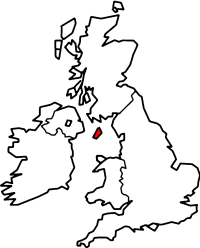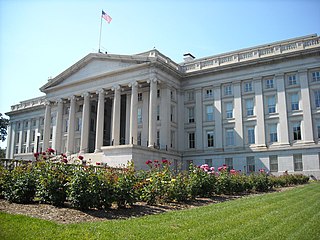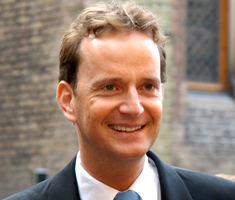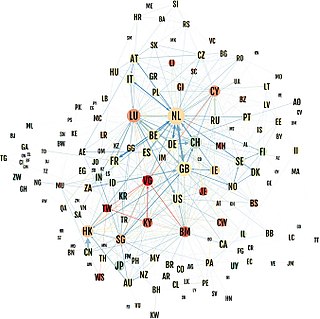This article needs additional citations for verification .(May 2016) |
The Fair Tax Town movement (FTT; also called the Powys tax rebellion) [1] is a movement established by several shop owners in Crickhowell, Powys, Wales.
This article needs additional citations for verification .(May 2016) |
The Fair Tax Town movement (FTT; also called the Powys tax rebellion) [1] is a movement established by several shop owners in Crickhowell, Powys, Wales.
During the establishment of the movement, a documentary was made by the BBC along with it. This documentary, narrated by Heydon Prowse is called "The Town that went Offshore" or "The Town That Took on the Taxman" and was first shown in January 2016.
The movie follows the business owners as they decide to establish an untaxed Manx company which designs and owns a brand (Crickhowell Fair Tax), use the brand in their advertising and pay royalties for using this brand, as big companies do with their own brands. Their Manx company sets up a Dutch subsidiary which receives the royalties and sends them to the Isle of Man, since Britain would tax royalties sent directly to a tax haven, but charges no tax on royalty payments to the Netherlands, and the Netherlands charges no tax on royalties sent to tax havens. Thus their money accumulates tax-free in the Isle of Man, and the movie suggests ways to use it for expenses in Wales, such as borrowing it. The movie also discusses customer relationship managers which tax authorities assign to big businesses to ensure their tax arrangements are valid. [2] [3]
The movement's aim is to persuade governments to change their tax regulation so that small businesses get the same level of tax as multinationals and other large businesses. [4] To help achieve this, FTT has started to share their expertise on how to make businesses engage in tax avoidance. Since then, many other towns have adopted the scheme.
After spending two years developing and publicizing the project, the Crickhowell businesses decided not to proceed. Prowse, the documentarian, said he hoped another group of people would take the idea another step, "If you want to put your money through a scheme like that, you’ve got to expect that the taxman’s going to contact you and you’re going to have to defend yourself, possibly in court." [5]

The Isle of Man or Mann, is a self-governing British Crown Dependency in the Irish Sea, between Great Britain and Ireland. It is one of the Celtic nations and is the homeland of the Manx people, a Celtic ethnic group. As head of state, Charles III holds the title Lord of Mann and is represented by a Lieutenant Governor. The government of the United Kingdom is responsible for the Isle of Man's military defence and represents it abroad, but the Isle of Man still has a separate international identity.

The economy of the Isle of Man is a low-tax economy with insurance, online gambling operators and developers, information and communications technology (ICT), and offshore banking forming key sectors of the island's economy.
Corporate haven, corporate tax haven, or multinational tax haven is used to describe a jurisdiction that multinational corporations find attractive for establishing subsidiaries or incorporation of regional or main company headquarters, mostly due to favourable tax regimes, and/or favourable secrecy laws, and/or favourable regulatory regimes.
Creative accounting is a euphemism referring to accounting practices that may follow the letter of the rules of standard accounting practices, but deviate from the spirit of those rules with questionable accounting ethics—specifically distorting results in favor of the "preparers", or the firm that hired the accountant. They are characterized by excessive complication and the use of novel ways of characterizing income, assets, or liabilities, and the intent to influence readers towards the interpretations desired by the authors. The terms "innovative" or "aggressive" are also sometimes used. Another common synonym is "cooking the books". Creative accounting is oftentimes used in tandem with outright financial fraud, and lines between the two are blurred. Creative accounting practices have been known since ancient times and appear world-wide in various forms.

An offshore bank is a bank that is operated and regulated under international banking license, which usually prohibits the bank from establishing any business activities in the jurisdiction of establishment. Due to less regulation and transparency, accounts with offshore banks were often used to hide undeclared income. Since the 1980s, jurisdictions that provide financial services to nonresidents on a big scale can be referred to as offshore financial centres. OFCs often also levy little or no corporation tax and/or personal income and high direct taxes such as duty, making the cost of living high.
Tax avoidance is the legal usage of the tax regime in a single territory to one's own advantage to reduce the amount of tax that is payable by means that are within the law. A tax shelter is one type of tax avoidance, and tax havens are jurisdictions that facilitate reduced taxes. Tax avoidance should not be confused with tax evasion, which is illegal. Both tax evasion and tax avoidance can be viewed as forms of tax noncompliance, as they describe a range of activities that intend to subvert a state's tax system.

Crickhowell is a town and community in southeastern Powys, Wales, near Abergavenny, and is in the historic county of Brecknockshire.
A tax haven is a term, often used pejoratively, to describe a place with very low tax rates for non-domiciled investors, even if the official rates may be higher.
Ronen Palan is an Israeli-born economist and Professor of International Political Economy in the Department of International Politics at the City University London. He has many books and articles on the political economy of the state, globalisation and state strategies, and evolutionary approaches to the study of international relations. Ronen Palan was of the founding editors of the Review of International Political Economy. Palan's major empirical work is the area of offshore financial centres and tax havens. Palan has argued that offshore finance "is certainly not the sole cause for the decline of the nation-state, but it must be seen as an important contributing factor to the decline".

An offshore financial centre (OFC) is defined as a "country or jurisdiction that provides financial services to nonresidents on a scale that is incommensurate with the size and the financing of its domestic economy."

Treasure Islands: Tax Havens and the Men who Stole the World (2011) is a non-fiction book about the secretive role of offshore banks and tax havens in global economic affairs. The book was written by Nicholas Shaxson, a political analyst and associate Fellow of the Royal Institute of International Affairs. It was first published on 6 January 2011.

The European Union financial transaction tax is a proposal made by the European Commission to introduce a financial transaction tax (FTT) within some of the member states of the European Union (EU).

Mossack Fonseca & Co. was a Panamanian law firm and corporate service provider. At one time it was the world's fourth-largest provider of offshore financial services. From its establishment in 1977 until the publication of the Panama Papers in April 2016, the company remained mostly obscured from public attention, even though it was a major firm in the global offshore industry and acted for approximately 300,000 companies. Prior to its dissolution, the company employed roughly 600 staff members spread across 42 countries.

Heydon Prowse is a British activist, journalist, satirist, director and comedian. He is best known for writing and performing in BBC Three's Bafta-winning The Revolution Will Be Televised alongside Jolyon Rubinstein. As part of that show he gave George Osborne a GCSE maths text book, a stunt that featured on the front cover of The Daily Telegraph and other publications.

Base erosion and profit shifting (BEPS) refers to corporate tax planning strategies used by multinationals to "shift" profits from higher-tax jurisdictions to lower-tax jurisdictions or no-tax locations where there is little or no economic activity, thus "eroding" the "tax-base" of the higher-tax jurisdictions using deductible payments such as interest or royalties. For the government, the tax base is a company's income or profit. Tax is levied as a percentage on this income/profit. When that income / profit is transferred to a tax haven, the tax base is eroded and the company does not pay taxes to the country that is generating the income. As a result, tax revenues are reduced and the country is disadvantaged. The Organisation for Economic Co-operation and Development (OECD) define BEPS strategies as "exploiting gaps and mismatches in tax rules". While some of the tactics are illegal, the majority are not. Because businesses that operate across borders can utilize BEPS to obtain a competitive edge over domestic businesses, it affects the righteousness and integrity of tax systems. Furthermore, it lessens deliberate compliance, when taxpayers notice multinationals legally avoiding corporate income taxes. Because developing nations rely more heavily on corporate income tax, they are disproportionately affected by BEPS.

Dutch Sandwich is a base erosion and profit shifting (BEPS) corporate tax tool, used mostly by U.S. multinationals to avoid incurring European Union withholding taxes on untaxed profits as they were being moved to non-EU tax havens. These untaxed profits could have originated from within the EU, or from outside the EU, but in most cases were routed to major EU corporate-focused tax havens, such as Ireland and Luxembourg, by the use of other BEPS tools. The Dutch Sandwich was often used with Irish BEPS tools such as the Double Irish, the Single Malt and the Capital Allowances for Intangible Assets ("CAIA") tools. In 2010, Ireland changed its tax-code to enable Irish BEPS tools to avoid such withholding taxes without needing a Dutch Sandwich.
In 2010, the United States implemented the Foreign Account Tax Compliance Act; the law required financial firms around the world to report accounts held by US citizens to the Internal Revenue Service. The US on the other hand refused the Common Reporting Standard set up by the Organisation for Economic Co-operation and Development, alongside Vanuatu and Bahrain.

The Paradise Papers are a set of over 13.4 million confidential electronic documents relating to offshore investments that were leaked to the German reporters Frederik Obermaier and Bastian Obermayer, from the newspaper Süddeutsche Zeitung. The newspaper shared them with the International Consortium of Investigative Journalists, and a network of more than 380 journalists. Some of the details were made public on 5 November 2017 and stories are still being released.

Conduit OFC and sink OFC is an empirical quantitative method of classifying corporate tax havens, offshore financial centres (OFCs) and tax havens.

Ireland has been labelled as a tax haven or corporate tax haven in multiple financial reports, an allegation which the state has rejected in response. Ireland is on all academic "tax haven lists", including the § Leaders in tax haven research, and tax NGOs. Ireland does not meet the 1998 OECD definition of a tax haven, but no OECD member, including Switzerland, ever met this definition; only Trinidad & Tobago met it in 2017. Similarly, no EU–28 country is amongst the 64 listed in the 2017 EU tax haven blacklist and greylist. In September 2016, Brazil became the first G20 country to "blacklist" Ireland as a tax haven.